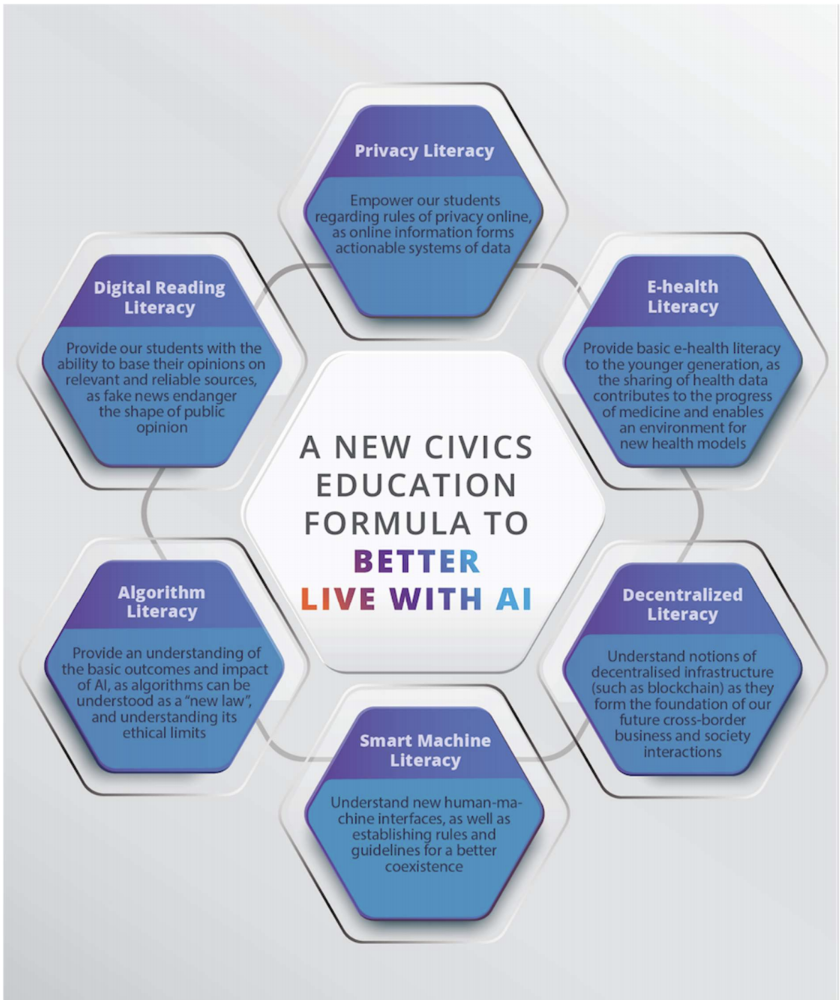We Need to Reinvent Civic Education for the AI Future
Tue, 06/25/2019 - 12:00
With the potential applications of AI increasing each day, it is our duty to think about the positive effect this technology can have on our daily lives. The intersection of humans and machines will be at the very core of this new world, creating a new kind of society. The rise of AI constitutes a fantastic opportunity for societies throughout the world especially for future generations, who will grow up in harmony with these new technologies.
About Civic Education
Soon after the French Revolution, the two statesmen Talleyrand and Condorcet posited the importance of educating students in their rights and duties. This citizen involvement continues today, with two major goals. Firstly, it aims to empower people to become aware of the impact they can have on political life, for instance by understanding institutional processes and recognising their rights. Secondly, its purpose is to get people to understand the significance of community and the role each individual should play in it.
A working knowledge of democracy, and more importantly an understanding, are essential to its continuity. It is an objective OECD has set as its mission: educating students in democracy and public institutions so they become fully engaged citizens. Civic education is taught in all nations; therefore, its purpose and the way it is put into practice differs from one country to another. While citizenship is highly supported by parents’ education in some eastern countries such as Japan, civic education is still very much supported by schools in Western countries. Nonetheless, the consequences of globalisation, including migration of peoples and homogenisation of cultural practices, have led us to view citizenship in global terms today.
The Impact of AI on Democracy and Community Life
Concerns about the roles AI and big data will play in the near future have been raised by China’s plans to introduce a “social credit system” by 2020. This initiative (1) aims to algorithmically assign a social credit to every Chinese citizen, in other terms a trustworthiness rate, based on their economic and social data. Such a decision has to be taken very seriously — do we want our children to live in a Black Mirror episode? — and proves AI will significantly influence democracy and community life.
AI will affect our democracy in a number of ways. Many of these will be positive, including empowering states in defending their democracy by reinforcing cybersecurity tools and processes. We know from the Women’s Forum that there were around 707 million cybersecurity breaches in 2015, and 554 million in just the first half of 2016. The self-learning and automation capabilities enabled by AI can increase effectiveness and reduce costs of security systems and alerts-related tools, keeping us much safer from terrorism or even smaller scale identity theft. AI will also contribute to improving transparency systems which will be valuable in defending foundational elements of democracy, monetary automated regulation, public transparency system, court transparency, legal task automation and more.
However, bots, disguised as ordinary human accounts, can spread misinformation and contribute to an acrimonious political climate on social networks, influencing how citizens vote. People lose faith in politics in the wake of serious scandals related to the misuse of personal data, a recent egregious example of which was Cambridge Analytica harvesting private information from 50 million Facebook users to influence 2016’s US presidential election. And finally, AI could also potentially reinforce racial and gender bias (a worrying report (2) claimed that a computer program used by a US court for risk assessment was biased against black prisoners).
With regards to wider society, the fast-paced development of AI-related technologies will modify the composition of our global community and force us to rethink the role of humans in this new artificial and human intelligence-driven society. We are moving toward a human-machine coexistence, as most famously demonstrated by Sophia, the human-like AI who has been granted citizenship in Saudi Arabia. By integrating robots and machines in our societies, we will free people up from ungratifying activities. We must reflect on how we can integrate smart machine into our environment, and how to interact with them.
Let’s Re-invent Citizenship for a New World
As our society is going through major technological developments and welcoming new smart players and machines contributing to our well-being, we must ask ourselves if civic education is fit for purpose in an AI-empowered, decentralised world.
Data science will be an important competency for future students. However, we must also teach the next generation how to interface with machines, how to pilot their data settings, and how to respect intelligent systems. We need to give our children the keys to understand the power of data, taking them from a crowd unconsciously generating data to a conscious crowd aware of its value. By educating our children in data, which is essentially AI’s fuel, they will grow up cognisant of privacy and consent.
The following core civic capabilities will be useful:
- Research, critically assess and use sources of information for civic, political, society-related purpose
- Produce civic-related content and effectively distribute and communicate it
- Manage data settings while respecting civic rules and guidance (like healthcare electronic record)
- Access the right to forget in order to entirely be responsible for their online presence
- Respect smart and autonomous machine for their added value to the society and understand how to interface properly with such a new environment
How to Proceed and What We Need
Reinventing education doesn’t mean denigrating technological and societal evolutions, but rather adapting it in a constructive manner so we, as human beings, can live peacefully in this new world. Here are six tracks which will need to be considered as our new civic education pillars in order to better live with AI.
Digital reading literacy
How do you assess the credibility of a source? How do you identify real news from fake? Future generations will need to base their opinions on relevant and reliable sources. We have to close the gap highlighted in an OECD’s study (3): “Canada, Korea and Japan are the OECD countries with a largest percentage of students at the highest level of digital reading proficiency. These students navigate online information autonomously and efficiently, dealing with ambiguity and unfamiliar contexts. Contrarily, Chile, Hungary and Israel have a larger percentage of students at the minimum proficiency level.”
Privacy literacy
“Most youth (90%) surveyed place heavy emphasis on self-empowerment as the most effective means of staying safe online through the acquisition of information, media and technological competencies. They rate other options of protection online, such as familial protection or government protection, substantially lower.” This key finding, taken from a UNESCO study (4), shows the importance of empowering students regarding privacy. All information posted on social networks forms a system of actionable data about habits, beliefs, and opinions. Alerting the general public, especially younger audiences, on the importance of privacy online is one of the biggest challenges we have to embrace.
E-health literacy
AI is spreading out into every field: we have to grasp the opportunities it offers. Health is the field where we need to better manage our data privacy. Health data is critical to helping machine contribute to medicine. Access to health data can help save lives thus it seems relevant to empower each citizen with their own health data. This must start with providing basic E-health literacy to younger generations. AI allows us to think about “the other”, in other words taking care of others: by sharing health data, we can finally help others as much as we do ourselves.
Algorithm literacy
In 2000, Lawrence Lessig wrote “Code is law” to warn about the necessity to regulate code. We could use the same argument today and say, “Algorithm is law”. Algorithms are about to shape the way we organise our society and influence our choices. Therefore, it is our collective responsibility to provide our students an understanding of the basic outcomes and impact AI systems will have on decision-making in our daily lives.
Smart machine literacy
Smart machines and smart cities are more than just ideas at this point; they’re a reality. Autonomous vehicles are now on trials in Singapore and will arrive shortly in France. Adapting to co-exist with these new systems is now a time-sensitive requirement. Should we respect machines as we respect humans? What are the limits? The very last examples of the OFO bicycles dying everywhere in Paris or Singapore illustrate that humans are not always ready to live with smarter machines (5).
Decentralised literacy
Rather than creating centralised systems, we should help citizen understand the power of decentralised solutions and how blockchain or any decentralised services can break borders between countries, giving anyone broader access to the world and to democracy. For instance, the Louis Bachelier Institute has launched “The Climate Chain” (6) aimed at using blockchain technology in the implementation of the Paris climate agreement (7).
In a society where collective intelligence brings more value than individual, self-serving decision-making, we must position civic education towards this collaboration between students, teachers, parents and external actors, and help each of them to learn from their peers.
Civic education should not be restricted to one hour per week but focus on following what’s happening. Let’s offer students the possibility to go outside the confines of school and engage with this new world, to help design the society in which they will be living in.
It is not a question of “betting on AI” but rather a matter of embracing the potential that AI offers to create a new, well-balanced, human-machine society and democracy.

- https://www.wired.co.uk/article/chinese-government-social-credit-score-privacy-invasion
- https://www.propublica.org/article/machine-bias-risk-assessments-in-criminal-sentencing
- OECD (2015b), Students, Computers and Learning: Making the Connection, PISA, OECD Publishing Paris, http://dx.doi.org/10.1787/9789264239555-en
- UNESCO - Survey on Privacy in Media and Information Literacy with Youth Perspectives - http://unesdoc.unesco.org/images/0025/002589/258993e.pdf
- https://www.straitstimes.com/singapore/bike-sharing-firm-ofo-hitting-the-brakes-on-misuse
- https://www.institutlouisbachelier.org/en/news/the-climate-chain-2/
Live with AI gathers thought leaders from France and Singapore to lead research projects on the positive impact of AI to our society. SGInnovate is a partner of this initiative.
This article was originally published here.
Trending Posts
- From satellites to startups, Singapore’s space sector is pushing new frontiers
- How leaders should rethink cybersecurity strategy
- How to Future-Proof a Career in Deep Tech? Start here.
- The future of fusion energy: What will it take to bring the power of the stars to earth?
- Keeping satellites safe: How CYSAT Asia 2026 is tackling space cybersecurity






